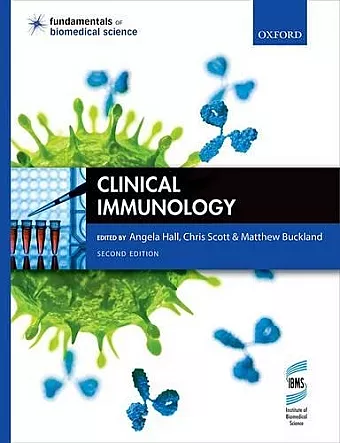Clinical Immunology
Angela Hall editor Chris Scott editor Matthew Buckland editor
Format:Paperback
Publisher:Oxford University Press
Published:10th Mar '16
Should be back in stock very soon

Biomedical scientists are the foundation of modern healthcare, from cancer screening to diagnosing HIV, from blood transfusion for surgery to food poisoning and infection control. Without biomedical scientists, the diagnosis of disease, the evaluation of the effectiveness of treatment, and research into the causes and cures of disease would not be possible. The Fundamentals of Biomedical Science series has been written to reflect the challenges of practicing biomedical science today. It draws together essential basic science with insights into laboratory practice to show how an understanding of the biology of disease is coupled to the analytical approaches that lead to diagnosis. Assuming only a minimum of prior knowledge, the series reviews the full range of disciplines to which a Biomedical Scientist may be exposed - from microbiology to cytopathology to transfusion science. Clinical Immunology gives the new biomedical scientist an insight into the function of the immune system, the front line of defence against pathological disease, and the diagnostic techniques used to identify associated malfunctions and disorders. By examining the key immunological principles and scientific basis of laboratory techniques with a focus on the biomedical scientist's role in the diagnostic laboratory, the reader is provided with everything needed to prepare for a specialist qualification in immunology. Current tests, the rationale behind their use, the technologies employed, and the quality measures applied are illustrated by specific case studies showing how the clinician interprets the results to help the patient. Online Resource Centre The Online Resource Centre to accompany Clinical Immunology features: For registered adopters of the book: - Figures from the book, available to download For students: - Answers to self-check and end of chapter questions - Video podcasts including interviews with practicing biomedical scientists and 'in the lab' footage showing biomedical science in practice
Review from previous edition The main strength is the description of the methods used in a laboratory setting. This is a unique feature and makes it stand out from other textbooks in the area. * Dr Fiona L. Henriquez, University of the West of Scotland *
Using case studies really helps to integrate knowledge in an applied context. Students not only get to understand what is happening, but they begin to see why this is important, how this can affect the patient, and what it could mean to them in the diagnostic laboratory. * Glenn Hussey, Keele University *
This excellent book would be particularly useful for undergraduates aiming to enter a career in biomedical science, and also a worthwhile read for trainee and practising biomedical scientists. * Immunology News *
ISBN: 9780199657650
Dimensions: 246mm x 196mm x 15mm
Weight: 786g
360 pages
2nd Revised edition